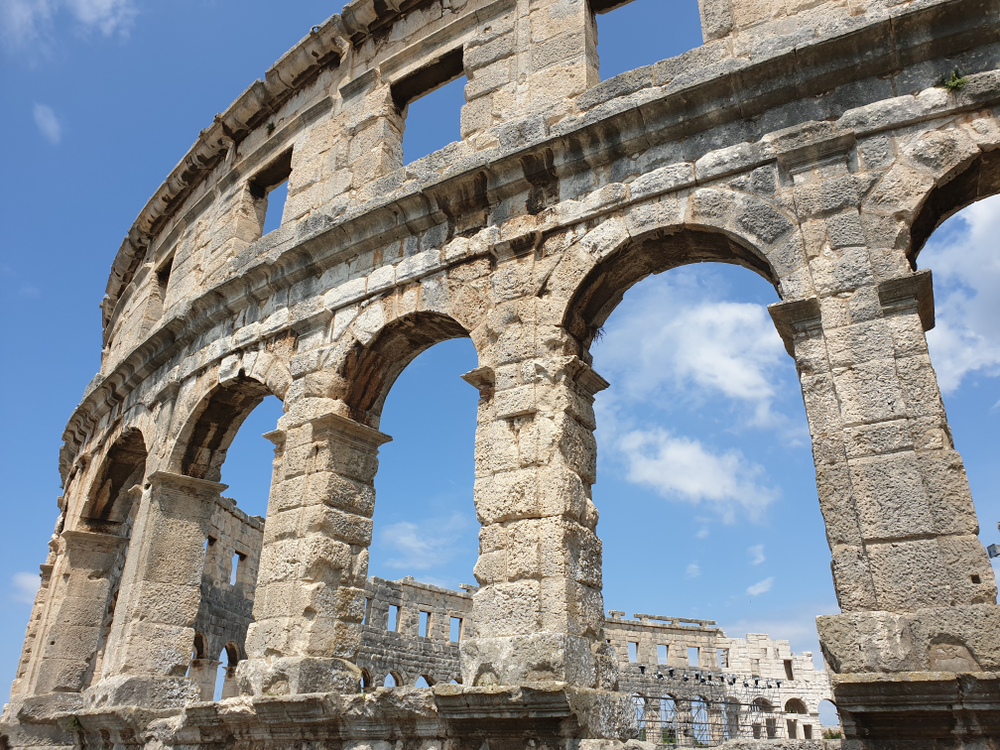Arena at Pola © laksena/Shutterstock
“I pedal and dream of the Brijuni, there in a westerly direction, that little archipelago of wonders, a royal theater from the Augustan times to the Tito ones”. Fabio Fiori on the saddle of his “very efficient ecological machine” continues towards Pola
The bicycle is not only a very efficient ecological machine, but also a timeless phantasmagorical contraption. Because the bike allows you to grind kilometers without consuming fossil energies, to dilate images without using drugs. I don’t know if pedaling increases the level of oxytocin in the blood, but I know that it’s easier to fantasize, watching the sky lighten, like a few minutes ago on the road that goes from Rovinj to Bale, or the leaves of the olive trees sway, like now on the road that from Bale it runs over the plateau towards Vodnjan.
I cycle and dream of the Brijuni, there in a westerly direction, that little archipelago of wonders, a royal theater from the Augustan times to those of Tito. Blue arabesque islands that enchant even just looking at them from afar, in the silence set to music by the wind and the sea that my little sail gave me many years ago. Convoluted islands of green, which are also enchanting imagining them from here, in those intervals of silence that open up between a car and a van whizzing past me.
The sun peeps through white cumulus clouds pushed by the Mistral. From Rovinj to Vodnjan it is only 25 kilometers, but the distance is much greater, at least in terms of atmospheres. Because Vodnjan is a small agricultural town far from coastal tourist flows, because in its historic center run-down houses and buildings tell a painful story of conflicts and depopulation. Here there was a first strategic exodus in the years of the First World War, then a second of the Italians after the Second. Even if less people left here than elsewhere and the Istro-Venetian are still a significant and active minority in cultural and political terms. “Once more oil and wine flowed here than water. Vodnjan was rich, under Venice it was bigger than Pula”, says Paolo Rumiz in a diary of a journey made on foot thirty years ago, when war was raging in the Balkans and Istria, its people, resisted yet another delirium ethnic.
Pause in a bar in the square of the Church of San Biagio. A Laska ice cold and some peanuts. To my right the imposing bell tower in Venetian style, built in the first decades of the 19th century, the tallest in Istria, with its 60 metres. Vodnjan “who prides himself on siding with Peroi and Gallesano, as a small but daring sentinel of the Adriatic …[con] the three bell towers, lined up, with their bells greet the tartanas of Fazana and the boats of Rovinj that go fishing for sardines unfurling lateen sails to the breeze”, I transcribe from a monumental twentieth-century history of the city.
The descent towards Pula crosses fields where, despite the proliferation of artisan and commercial areas, the olive trees remain the masters. The secular ones and other young people who testify to new agricultural attentions, in this red and fertile land.
The road leads right into the heart of Roman Pula, to that Arena which is its symbol. The luminosity of its white Istrian stone, which stands out against the cerulean sky of this September afternoon, bears witness to thousands of years of beauty. An arena that after the glorious and bloody seasons of the Roman age, fell into abandonment, becoming a stone quarry useful for building churches and palaces, which even risked being dismantled in the sixteenth century, to be transported and rebuilt in Venice. At least that’s what I read in a clipping from the 1988 newspaper “Arena di Pola”, found on the net, dedicated to Senator Gabriele Emo who thwarted this project.
If the shows in the Arena have a precise calendar, from its steps you can always see that of the Adriatic, whose waters enter the deep inlet of Polesine and almost touch its foundations. I observe his deity, against the light framed by an arch. Then I open Rilke and read: “It would be time, now, for gods to emerge / from inhabited things… Let your dawn still be, o gods. / We repeat. But you are origin.”
Gods, you are sea and sky, light and wind.
PS
Land wind by Paolo Rumiz (BEE, 2020) is a travel diary written in the early 1990s, in the midst of the Balkan fire. “A trip to Istria as immediate, easy, weekend thing, as insidious and all uphill”, writes Fulvio Tomizza in the preface to the first edition. An Istria that can boast a millenary mimicry of political power, “its being no-man’s land. Neither Italian, nor Slovenian, nor Croatian. Its being ‘ours’…land of those who inhabit it, cultivate it, live it”. And, I allow myself, also of those who walk or pedal, row or sail it.
Have you thought about a subscription to OBC Transeuropa? You will support our work and receive preview articles and more content. Subscribe to OBCT!
Comments, as far as possible, are screened by our staff before being made public. The time required for this operation can vary. Go to our policy
